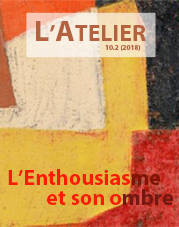L'enthousiasme et la philosophie de l'art
Keywords:
Enthousiasme, Platon, Ion, Philosophie de l'artAbstract
Nous interrogeons dans ce travail la notion « d'enthousiasme » à partir de l'usage qu'en fait Platon dans le dialogue Ion. La première partie de notre propos, nourrie des lectures et des interprétations contemporaines du texte, tâche d'en restituer la teneur ; elle a pour objet l'enthousiasme entendu comme persiflage, comme moquerie contournée dirigée contre la rhapsodie, et par ricochet contre la poésie. Dans la seconde partie, nous tentons de démontrer que la portée de la notion « d'enthousiasme » excède le cadre qui lui est initialement assigné par Platon. En effet, d'ironie anti-rhapsodique et anti-poétique, l'enthousiasme se mue en concept inaugural du questionnement philosophique sur l'art, concept qui non seulement ouvre un champ de réflexion, mais encore prescrit à ce champ son geste fondamental ou sa trame secrète, ce que nous appelons « l'absentement de l'artiste ». En dépossédant le poète de son activité créatrice, en l'assimilant à un serviteur sans poids du divin, Platon indistinctement fonde la philosophie de l'art et efface l'artiste, ou plutôt fonde la philosophie de l'art sur cet effacement. À partir du Ion, le philosophe aborde le phénomène artistique en-deçà ou au-delà de l'artiste, ou bien à partir d'une entité supérieure (dieu, la nature, l'être) qui en vient à créer avant ou à travers l'artiste instrumentalisé et mythifié, ou bien depuis l'œuvre d'art, toujours déjà créée et s'offrant à la contemplation d'un spectateur.
Enthusiasm and Philosophy of Art. In this paper, I question the notion of “enthusiasm” as it is used by Plato in the dialogue Ion. The first part, nourished by contemporary readings and interpretations, attempts to render the content of the text; its object is enthusiasm understood as a raillery, as an ironical mockery directed against rhapsody, and indirectly against poetry. In the second part, I try to demonstrate that the significance of the notion of “enthusiasm” exceeds Plato’s initial perspective. Indeed, from its anti-rhapsodic and anti-poetic function, enthusiasm turns into the inaugural concept of the philosophical questioning about art, a concept that not only opens a field of reflection, but also prescribes to this field its fundamental gesture or its secret plot, what I call “the erasing of the artist”. By dispossessing the poet of his creative activity and assimilating him to a weightless servant of the god, Plato at the same time founds the philosophy of art and erases the artist, or bases the philosophy of art on this erasure. After Ion, the philosopher considers the artistic phenomenon below or beyond the artist, either from a superior entity (god, nature, being) that comes to create before or through the instrumented and deified artist, or from the work of art, always already created and offering itself to a spectator.
Published
Issue
Section
License
- Work submitted for publication must be original, previously unpublished, and not under consideration for publication elsewhere. If previously published figures, tables, or parts of text are to be included, the copyright-holder's permission must have been obtained prior to submission.
- Authors of accepted manuscripts will assign to L'Atelier the right to electronically distribute their article, or publish it in any form (Internet, CD ROM, printed copy) but authors will retain copyright and, after the article has appeared in L'Atelier, authors may republish their text (in print and/or electronic form) as long as they clearly acknowledge L'Atelier as the original publisher.


